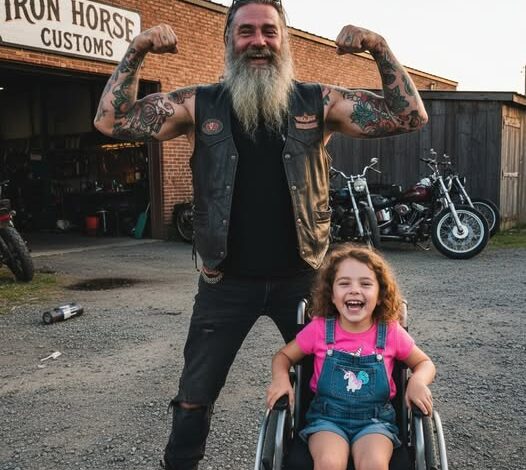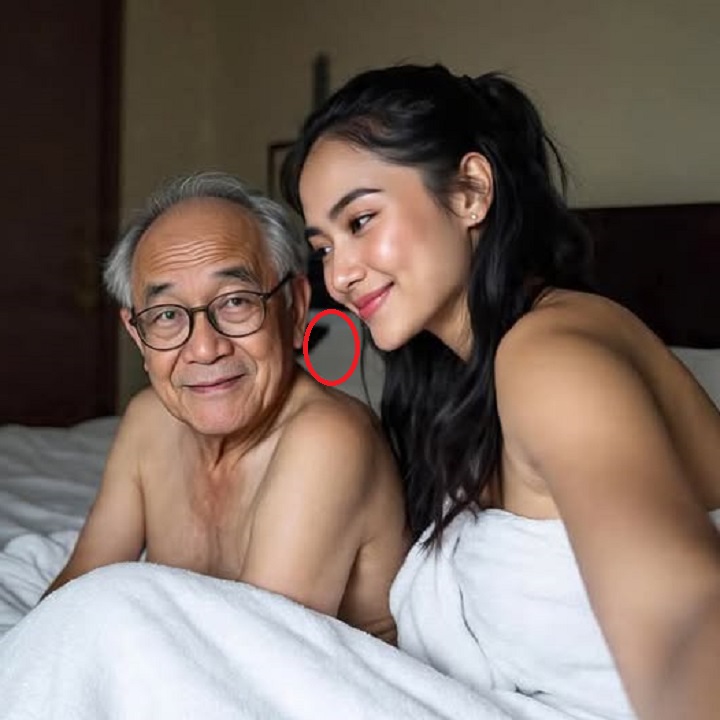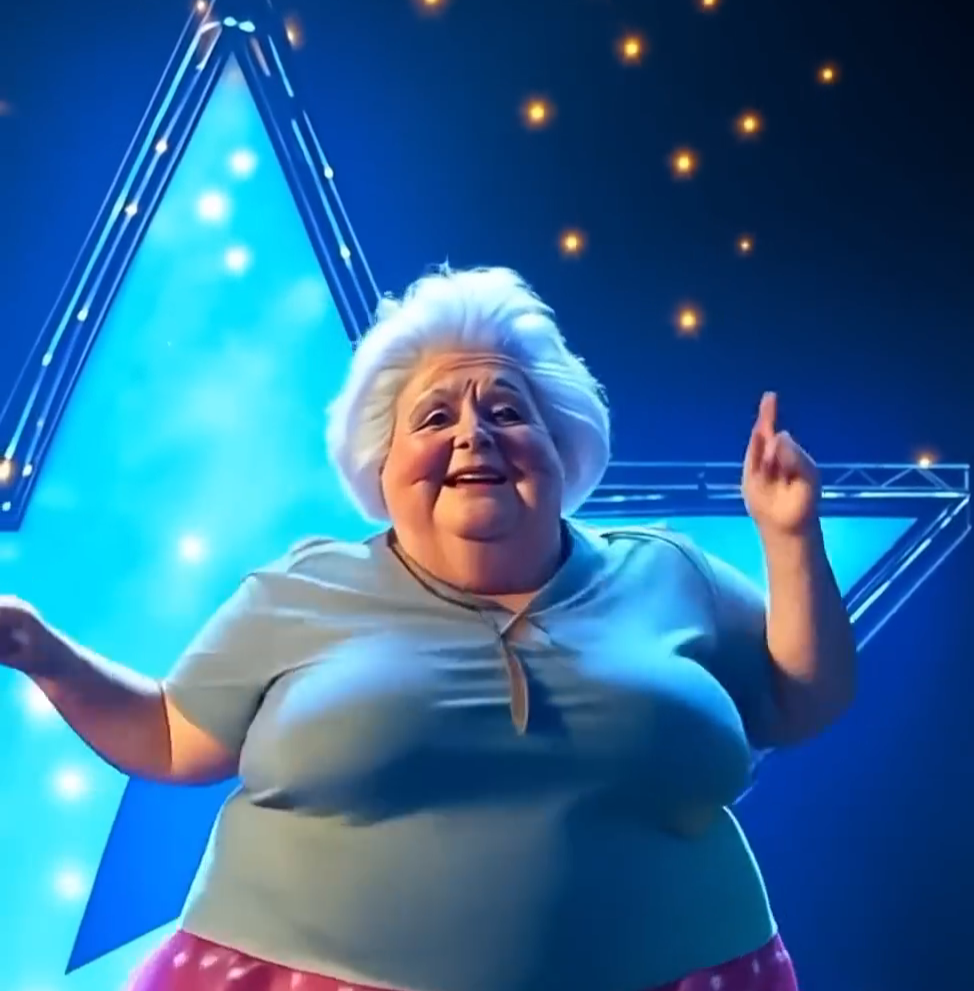
For three years, I judged him from across the street. Mike’s Cycle Shop, with its thundering motorcycles, leather-clad regulars, and a hulking, tattoo-covered owner, was the kind of place I warned my children to avoid. “Stay away from that man,” I used to say. “He’s dangerous.” I even called the police once when too many bikers gathered outside, convinced trouble was brewing.
But when my daughter’s wheelchair broke and the medical system turned its back on us, that “dangerous man” became the only person willing to help.
My daughter, Lily, was twelve at the time. She was born with spina bifida, and her custom wheelchair was her independence. It wasn’t just a chair; it was designed with hydraulics so she could raise herself to reach things, stand during transfers, and feel less small in a world built for people who walk.
When the hydraulic lift failed, the medical supply company quoted me $4,000 to fix it. Insurance dismissed it as “maintenance” and refused to cover the cost. We had $247 in savings. I called every charity, every church, every organization I could think of. Nothing. Meanwhile, Lily pretended it was fine, but I saw the struggle—the way she strained at school desks, the way her hands trembled trying to reach shelves, the way she cried quietly at night when she thought I couldn’t hear.
One morning, driving past Mike’s shop, I noticed his sign: We Fix Anything With Wheels.
Desperation pushed me into a place I swore I’d never go. I sat in my van for twenty minutes, staring at the open garage where Mike worked on a Harley. He was exactly what I imagined when I thought “intimidating biker”: six-foot-four, tattoo sleeves, grease under his nails, a scar running through his eyebrow. Rough-looking men in leather jackets surrounded him, music blaring.
But motherhood has a way of silencing fear. I wheeled Lily’s broken chair inside.
The music stopped. Heads turned. I felt like prey walking into a wolf den.
“Help you?” Mike asked, his voice low and gravelly.
“My daughter’s wheelchair,” I stammered. “The lift’s broken. I know you fix motorcycles, but the sign said anything with wheels and I thought maybe…”
He didn’t laugh. He didn’t mock me. He crouched beside the chair, his enormous hands startlingly gentle as he tested the controls. He listened, nodded. “Hydraulic system’s shot. Needs a full rebuild. Leave it. Come back tomorrow.”
“How much?” I asked, terrified of the answer.
He shrugged. “Depends on parts. We’ll see.”
That night I didn’t sleep. Lily didn’t either. I heard her muffled sobs through the wall.
At dawn, I drove past the shop. Mike was still there, covered in grease, surrounded by scattered motorcycle parts. He’d clearly worked all night. Another biker stopped me at the door. “Let him be. When Big Mike gets like this, you don’t interrupt.”
The next morning, when I pulled up again, Lily’s wheelchair was sitting outside my van. It looked transformed. Harley hydraulics gleamed under the frame. The controls were smoother, sturdier. He’d reinforced the structure, added grip padding, even built in stability features the original chair never had.
A note was taped to the back: Every kid deserves to chase their dreams. No charge. – Big Mike.
When Lily tried it, the joy on her face was indescribable. She could stand again. Reach her shelves. Move freely without pain. She named the chair Emma—a perfect name, she said, for something that made her feel strong.
I went back to thank Mike. The shop was closed. Not just closed—emptied overnight. A handwritten sign read: Moved On.
Other shop owners told me he did this often—helping quietly, then disappearing before anyone could thank him. One finally explained, “Mike lost his daughter to cancer. She used a chair. Fixing kids’ wheelchairs is how he grieves.”
That’s when my judgment turned into determination. I spent six months tracking him across seven states—following whispers of free wheelchair repairs, anonymous donations of parts, families whose kids suddenly got mobility back. Eventually, I found him in a small Colorado town, working under a different name.
When I walked into his shop, he froze. “You shouldn’t have come,” he muttered.
“Why?” I asked. “Why run from thank you?”
He kept working, eyes down. Finally, his voice cracked. “My daughter Emma used to thank me for everything. Even in pain, even near the end, she’d whisper, ‘Thank you, Daddy.’ Last thing she ever said to me. So when people thank me now… all I hear is her voice. And I can’t bear it.”
I showed him a video of Lily in her rebuilt chair, standing tall at school, hugging her friends. “She named the chair Emma,” I said. “She said anything that perfect deserved your daughter’s name. You didn’t fail her, Mike. She’s still helping kids—through you.”
For the first time, I saw him cry.
Mike eventually returned to our town—not permanently, but often. He became part of our lives, teaching Lily about engineering and hydraulics. At her high school graduation, she stood up in the chair he’d rebuilt, now upgraded many times over. She called him on stage: “My honorary uncle taught me that angels don’t always have wings. Sometimes they have motorcycles and tattoos and grease under their nails. Mike, you gave me freedom.”
The auditorium erupted as dozens of kids he’d quietly helped over the years rushed to hug him. For once, he stayed long enough to hear the gratitude—and to believe it wasn’t failure echoing back, but proof that love multiplies when shared.
Today, Lily is in her second year of engineering school, designing adaptive equipment for other kids. She rides to class on the only adaptive Harley in the state—built with Mike’s help.
I used to think bikers like him were dangerous. Turns out, the scariest man on the street was the one who gave my daughter her life back.
Some lessons cost you everything you thought you knew. This one was worth every penny.

